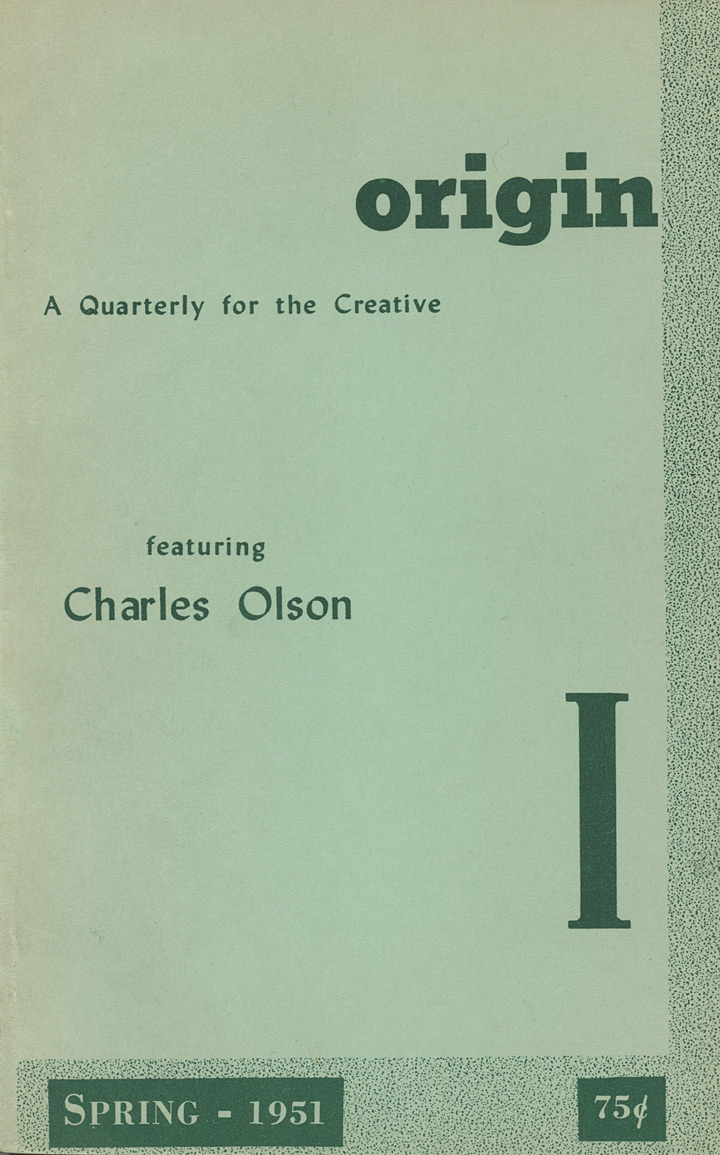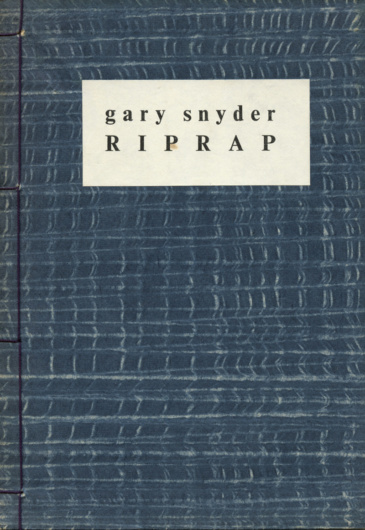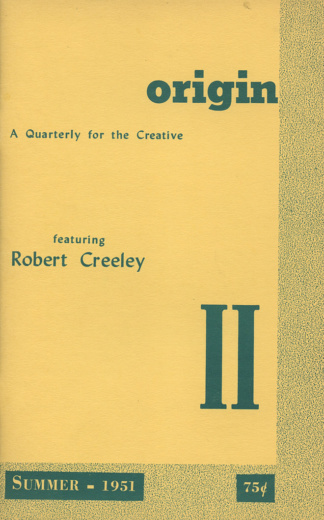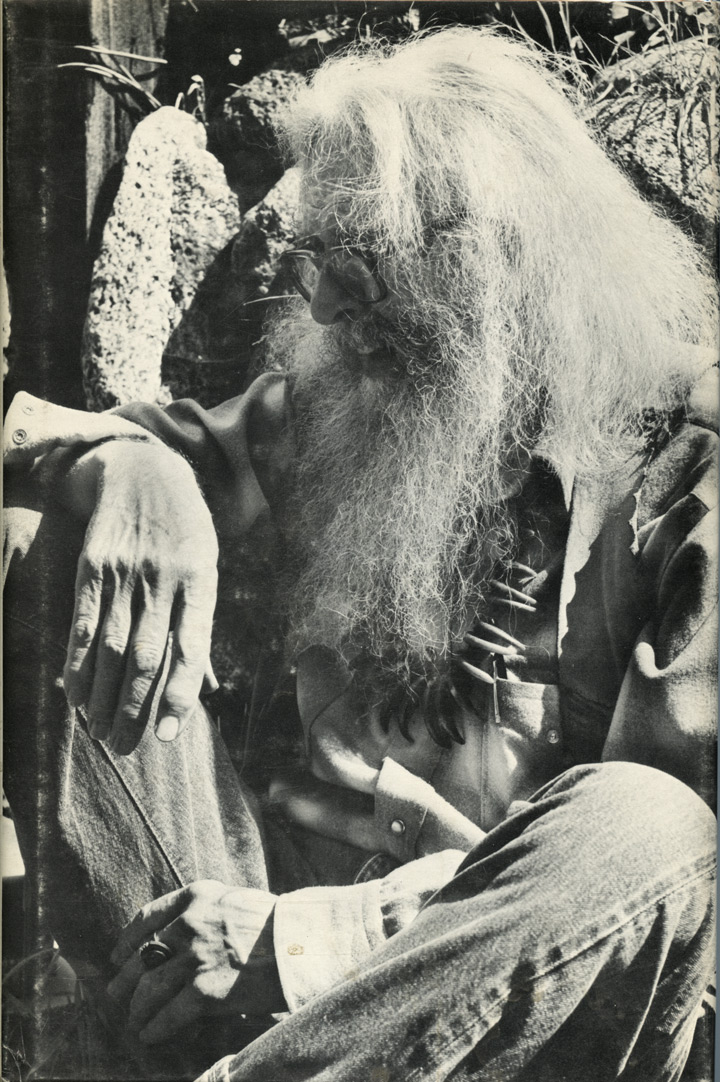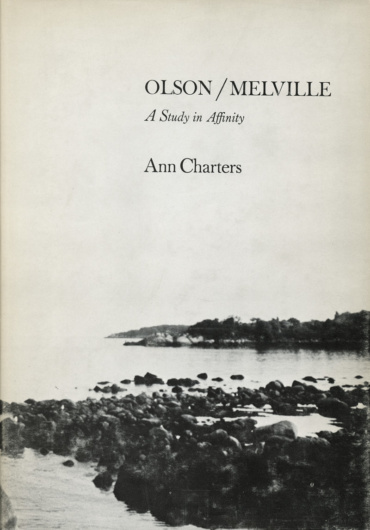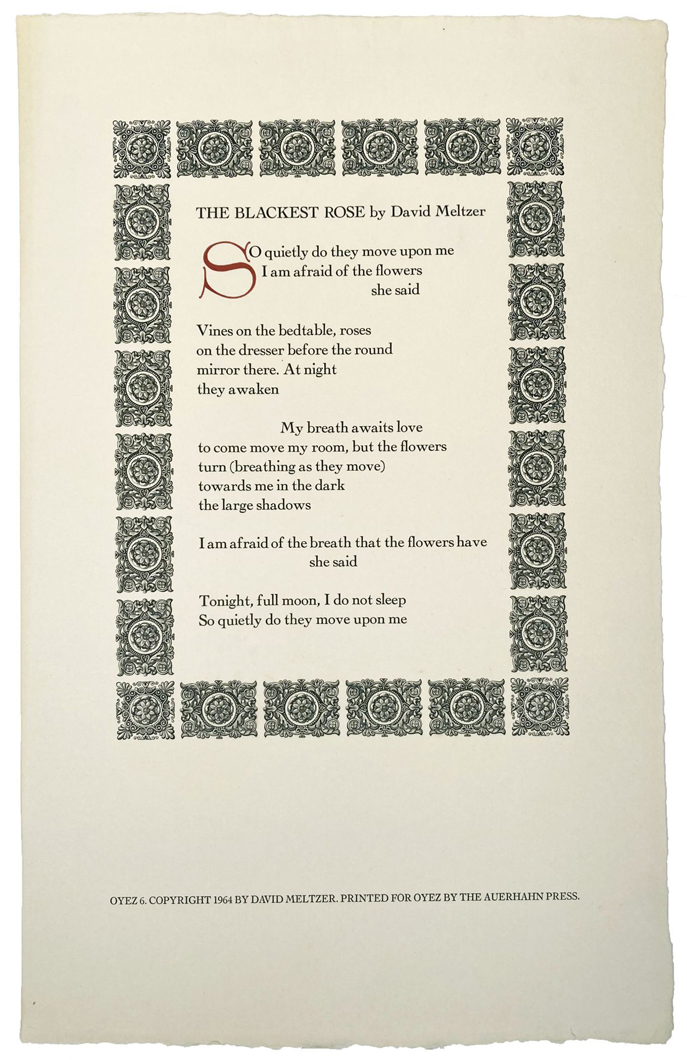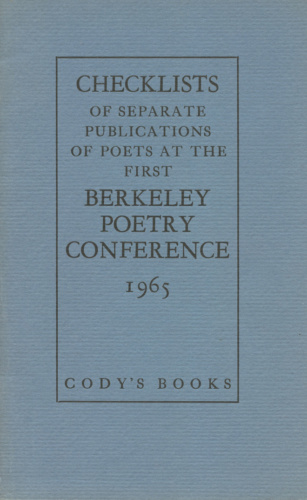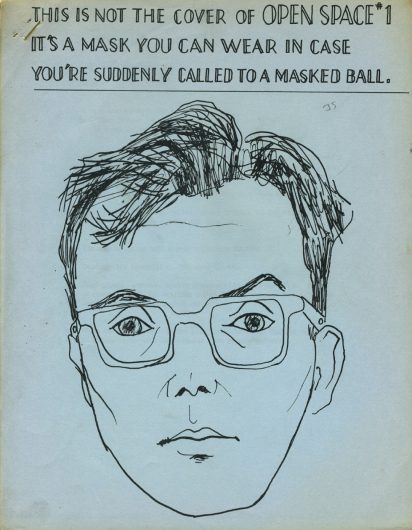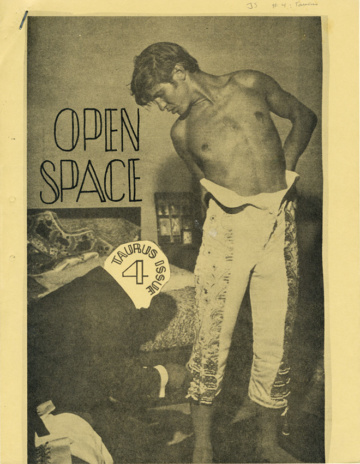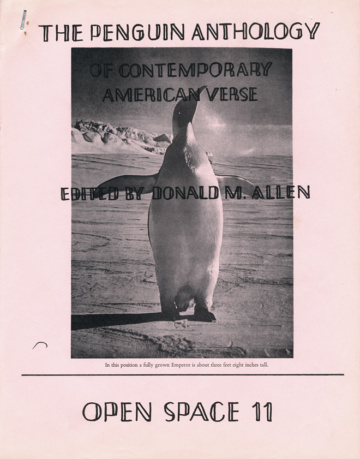Oink!
Dean Faulwell, James Leonard, Paul Hoover, and Maxine Chernoff
Chicago
Nos. 1–19 (1971–85). Superseded by New American Writing.
Dean Faulwell, James Leonard, and Paul Hoover (1–5); James Leonard and Paul Hoover (5–8); Paul Hoover and Maxine Chernoff (9/10–19).
Oink! 1 (1972). Cover by Evelyn Westermann.
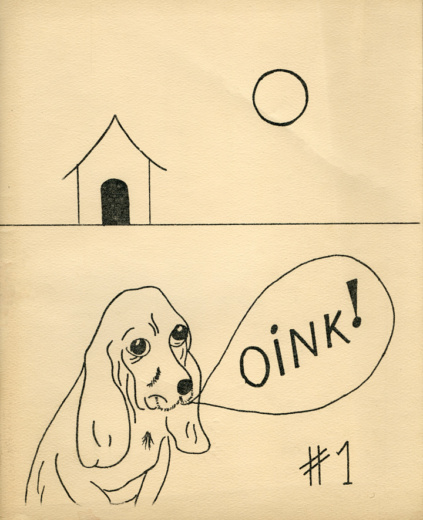
The literary quarterly Oink! was founded by University of Illinois at Chicago graduate students Dean Faulwell, James Leonard, and Paul Hoover during their weekly Monday night meetings at Dean Faulwell’s apartment at 438 Belden Avenue #5. The first issue contained only the work of the three editors, and included a manifesto: “We like the paintings of Willem de Kooning. They’re so messy and delicate and, I don’t know, brilliantly stupid. Our motto is simply ‘oink.’ Our goal is to uncover the true dirt of the unconscious (‘in all of its purity’). Our favorite poets are Paul Hoover, James Leonard, and me (probably not in that order) … We feel that the microscope is a better instrument for exploring life than the telescope.” Evelyn Westermann’s emblematic cover drawing was of a dog barking “Oink!” The magazine was mailed out gratis to poets the editors admired, such as Peter Schjeldahl, Ron Padgett, and Anne Waldman. Almost immediately, the magazine received poems from all three, plus a work by Larry Fagin.
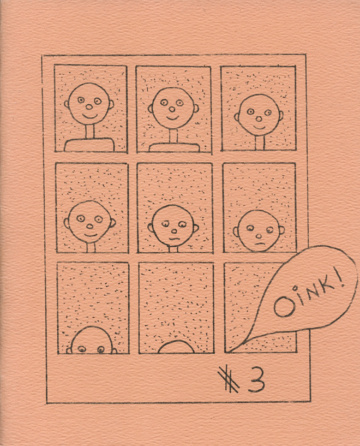
Oink! 3 (May 1972). Cover by Dean Faulwell.
The magazine’s design is that of 8½ x 14-inch paper sheets folded in half, stapled at the center and creased with the side of a coffee mug. The printing for the first four issues was carried out for free by using Melcheezadek Press, located in the Student Union of the University of Illinois at Chicago. The paper was purchased inexpensively in Chicago’s famous Printer’s Row neighborhood, delivered to UIC Student Services along with a typewritten mockup. Collation of the pages was accomplished by the editors during their Monday night meetings.
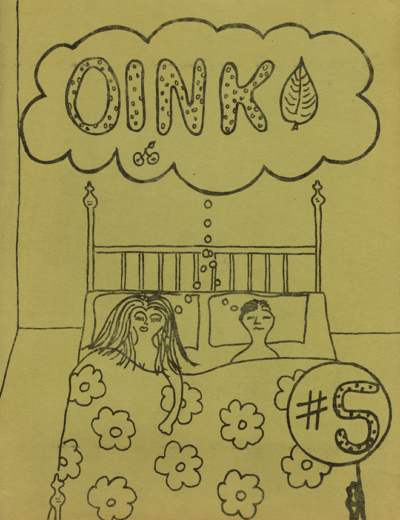
Oink! 5 (December 1972). Cover by Jim Leonard.
A production crisis occurred with issue five, when Dean Faulwell and Evelyn Westermann moved to Berkeley so that Evelyn could pursue a PhD in German at the University of California. Also, the remaining editors had taken their MA degrees and no longer could depend upon the printing services of Melcheezadek Press. They purchased a used desktop A. B. Dick offset printer from a Printer’s Row seller and began to do the printing themselves on Paul Hoover’s kitchen table, which shook with each rotation and rattled the room. They also had to create their own plates for printing by typing the text onto paper plates that would fit into a wide-body IBM Executive typewriter. This was a delicate task because errors in typing could not be corrected. The whole plate had to be scrapped when one occurred.
Also, Maxine Chernoff began to be involved in the magazine at issue five, not only for her poetry but also her assistance in production. Following issue six, James Leonard moved to Wisconsin to teach high school English. Maxine Chernoff joined Paul Hoover as coeditor with issue nine/ten. They continued as such through Oink! 19 and thirty-two issues of New American Writing.
Oink! issues cost $1 and were available at Chicago bookstores, such as Barbara’s Bookstore, where they were placed on consignment. Print runs were one hundred copies for the early sequence and no more than three hundred issues for the later sequence. At No. 11, we began to use professional printing services, and 11–14 were sent to local printers and staple-bound at the center. Beginning with Oink! 15, which consisted entirely of Peter Kostakis’s poetry volume, The Ministry of Me (1978), issues were perfect bound.
— Paul Hoover, Mill Valley, California, January 2017
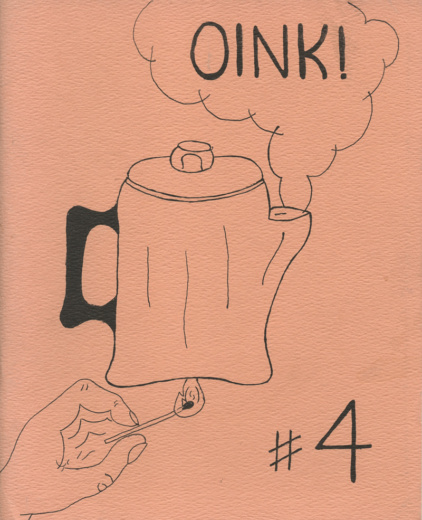
Oink! 4 (August 1972). Cover by Jim Leonard.
Contributors include
Keith Abbott
Tom Ahern
Allan Appel
Glen Baxter (cover art)
Michael Benedikt
Brooke Bergan
Charles Bernstein
Ted Berrigan
Joe Brainard (cover art)
Alan Britt
Donald Britton
Michael Brownstein
Peter Bushyeager
Paul Carroll
Aimé Césaire (trans. Clayton Eshleman & Annette Smith)
Maxine Chernoff
Tom Clark
Andrei Codrescu
Marc Cohen
Billy Collins
Clark Coolidge
Robert Coover
William Corbett
Mark Cramer (translations)
Lydia Davis
Connie Deanovich
Donna Dennis (artwork)
Laura Dennison (translations)
Stuart Dybek
Russell Edson
Kenward Elmslie
Elaine Equi
Clayton Eshleman
George Evans
Larry Fagin
Harrison Fisher
Charles Henri Ford
Richard Friedman
Amy Gerstler
John Godfrey
Neil Hackman
Carla Harryman
Lee Harwood
Bobbie Louise Hawkins
Lyn Hejinian
Robin Hemley
Gerrit Henry
Avron Hoffman
Joyce Holland
P. Inman
Honor Johnson
Tymoteusz Karpowicz (trans. Larry Levis & Jan Darowski)
M. Kasper
Alex Katz (cover art)
Vincent Katz
August Kleinzahler
Arthur Winfield Knight
Bill Knott
Ron Koertge
Allan Kornblum
Peter Kostakis
Rochelle Kraut
James Krusoe
Art Lange
James Laughlin
David Lehman
Steve Levine
Frederick Lazarus Light
Gerard Malanga
Michael Malinowitz
Lee Mallory
George Mattingly
Bernadette Mayer
Lewis MacAdams
Jean McGarry
Sharon Mesmer
Douglas Messerli
Peter Michelson
John Mort
G. E. Murray
Eileen Myles
Opal L. Nations
Djordje Nikolic (trans. Charles Simic)
Pat Nolan
Charles North
Alice Notley
Maureen Owen
Ron Padgett
Simon Perchik
Bob Perelman
Deborah Pintonelli
Jacques Prévert (trans. Harriet Zinnes)
Ilmars Purens
Carl Rakosi
Kenneth Rexroth
John Rezek
Pierre Ronsard (trans. Tony Towle)
Ned Rorem
Bob Rosenthal
Jerome Sala
Sal Salasin
Dennis Saleh
Leslie Scalapino
Barry Schechter
Peter Schjeldahl
James Sherry
Charles Simic
Jack Skelley
Carl Solomon
Philippe Soupault (trans. Kirby Olson)
Arlene Stone
James Tate
Ken Tisa (artwork)
Lydia Tomkiw
Tony Towle
David Trinidad
Tom Veitch
Paul Violi
Anne Waldman
Lewis Warsh
Barrett Watten
Tim Weigl
Marjorie Welish
Eugene Wildman
Jeff Wright
Geoffrey Young
Barry Yourgrau
L. L. Zeiger
Larry Zirlin

